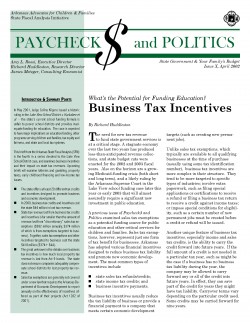
In May 2001, Judge Collins Kilgore issued a historic ruling in the Lake View School District v. Huckabee et al– the state’s current school funding formula is unfair to poorer school districts and provides inadequate funding for education. The case is expected to have major implications on education funding, other programs serving children and families, tax equity and fairness, and state and local tax systems.
This brief from the Arkansas State Fiscal Analysis (SFAI) is the fourth in a series devoted to the Lake View School District case, and examines business incentives and their impact on state tax revenues. Upcoming briefs will examine lotteries and gambling, property taxes, early childhood financing and low-income tax issues.
- The state offers at least 20 different tax credits and incentives designed to promote business and economic development.
- In 2000, business tax credits and incentives cost the state $44 million in lost tax revenue.
- State tax revenue lost from business tax credits and incentives is far smaller than the amount of revenue lost from “discretionary” sales tax exemptions ($582 million annually, $374 million of which is from exemptions targeted to business). Together, sales tax exemptions and other incentives targeted to business cost the state $418 million ($374+ $44).
- The great unknown in the debate over business tax incentives is how much local property tax revenue is lost from Act 9 bonds. The state does not ensure companies adequately compensate school districts for lost property tax revenue.
- Sales tax exemptions are generally not covered under a new law that requires the Arkansas Department of Economic Development to report annually on the effectiveness of incentives offered as part of their projects (Act 1282 of 2001).
